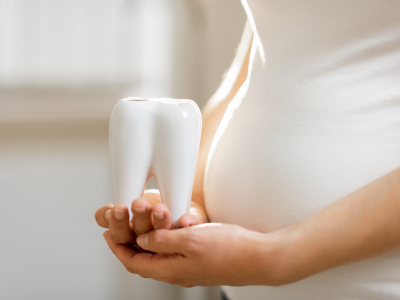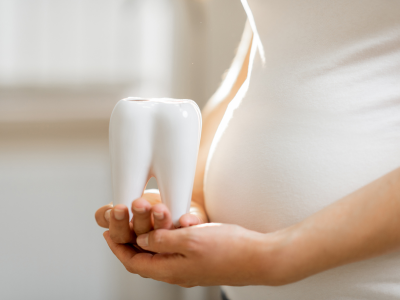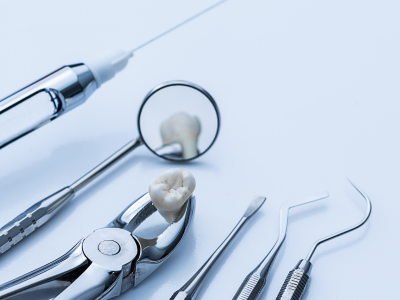Pregnancy is an incredible journey marked by numerous physical changes, and while many focus on the obvious transformations, such as a growing belly, hormonal shifts, and cravings, it’s crucial not to overlook the impact it can have on oral health, including the potential risk of losing teeth during pregnancy.
The connection between oral health and pregnancy is well-documented. Hormonal changes, particularly elevated levels of progesterone and oestrogen, can affect gum health and overall oral hygiene, potentially leading to an increased risk of dental issues, such as gum disease and tooth decay. Additionally, morning sickness and dietary changes can impact the teeth due to increased acidity in the mouth.
Understanding the risks and taking proactive steps to preserve your dental health during pregnancy is essential not just for your well-being, but also for the health of your growing baby. Here, we’ll explore ways to prevent losing teeth during pregnancy and maintain a healthy smile.
Importance of Oral Health During Pregnancy
When pregnant, hormonal changes can exacerbate pre-existing dental problems or lead to new oral health issues such as gum disease, gingivitis, or tooth decay. The increased levels of progesterone can contribute to gum sensitivity, making pregnant individuals more susceptible to inflammation and bleeding gums, a condition known as pregnancy gingivitis, which, if left untreated, may progress to periodontal disease. Periodontal disease has been associated with an increased risk of premature birth and low birth weight.
Beyond the immediate risks losing teeth during pregnancy, poor oral health can also have long-term implications. Dental problems left unattended can lead to infections that might spread, affecting the mother’s overall health and potentially impacting the foetus. Untreated infections in the mouth can contribute to systemic inflammation, which has been linked to an increased risk of complications like preeclampsia.

Tips to Prevent Losing Teeth During Pregnancy
Prioritise Oral Hygiene
Maintaining a diligent oral hygiene routine is vital throughout pregnancy. Brushing teeth at least twice a day using fluoride toothpaste and flossing regularly help remove plaque and prevent tooth decay and gum disease. It’s also advisable to replace toothbrushes every three months or sooner if the bristles become frayed.
Visit Your Dentist Regularly
Before or during pregnancy, schedule a dental check-up. Inform your dentist about your pregnancy and any medications or supplements you’re taking. Regular dental check-ups help identify and address any developing issues before they worsen. Dental cleanings, when recommended by your dentist, are safe during pregnancy and contribute to maintaining oral health.
Eat a Balanced Diet
Adopting a well-balanced diet rich in essential nutrients, especially calcium, is crucial for both you and your baby’s health. Calcium is vital for strong teeth and bones. Foods like dairy products, leafy greens, almonds, and fortified juices can contribute to your calcium intake. Limit sugary snacks and beverages to reduce the risk of tooth decay.
Manage Morning Sickness
Morning sickness, accompanied by increased acidity in the mouth due to vomiting, can be detrimental to tooth enamel. Rinse your mouth with water or a fluoride mouthwash after vomiting to neutralise the acid and prevent damage to your teeth. Avoid brushing immediately after vomiting as the abrasive action of brushing can erode softened enamel.
Monitor Gum Health
Hormonal changes during pregnancy can cause gum sensitivity and inflammation, increasing the risk of gingivitis and periodontal disease. Keep an eye out for signs of gum problems, such as bleeding, swelling, or tenderness. If you notice any issues, consult your dentist promptly for proper evaluation and treatment.
Signs and Symptoms of Dental Problems
Tooth Pain: Persistent or sudden toothaches could indicate tooth decay, infection, or dental trauma.
Swollen or Bleeding Gums: Inflamed, tender, or bleeding gums might be signs of gum disease (gingivitis or periodontitis).
Bad Breath: Persistent bad breath (halitosis) can be caused by bacteria in the mouth due to dental issues like cavities or gum disease.
Tooth Sensitivity: Increased sensitivity to hot, cold, sweet, or acidic foods or beverages might indicate enamel erosion, tooth decay, or exposed nerves.
Loose Teeth: Loose teeth in adults could signal advanced gum disease or other underlying dental problems.
Changes in Gum Appearance: Receding gums, changes in gum colour (such as redness), or the appearance of pus between gums and teeth can indicate gum disease or infection.

To prevent losing teeth during pregnancy:
Maintain Diligent Oral Hygiene: Brush at least twice daily with fluoride toothpaste and floss regularly to prevent plaque buildup and tooth decay, reducing the likelihood of losing teeth during pregnancy.
Regular Dental Check-ups: Schedule and attend routine dental visits, informing the dentist about your pregnancy. Professional cleanings and check-ups are safe and crucial for early detection of dental issues that could contribute to losing teeth during pregnancy.
Balanced Diet: Consume a nutrient-rich diet, especially high in calcium (dairy, leafy greens), to support tooth and bone health, minimising the risk of losing teeth during pregnancy due to deficiencies in essential nutrients.
Combat Morning Sickness: After vomiting, rinse your mouth with water or a fluoride mouthwash to neutralise acid and protect tooth enamel, thereby lowering the chances of losing teeth during pregnancy. Avoid brushing immediately after vomiting to prevent enamel erosion and potential tooth loss.
Monitor Gum Health: Hormonal changes during pregnancy can affect gums. Look out for signs of gum problems like bleeding, swelling, or tenderness, as these issues left untreated might contribute to losing teeth during pregnancy. Promptly address any concerns with your dentist to mitigate risks.
Maintaining optimal oral health during pregnancy is fundamental for the well-being of both the mother and the baby. By prioritising oral hygiene, visiting the dentist regularly, adopting a healthy diet, managing morning sickness, monitoring gum health, staying hydrated, and managing stress, expecting mothers can significantly reduce the risk of losing teeth during pregnancy and ensure a healthy smile for years to come.
Remember, seeking professional dental advice and care is essential for addressing any concerns or issues that may arise during pregnancy. With proper attention and care, preserving your dental health during this transformative period is achievable, allowing you to cherish your pregnancy journey while safeguarding your radiant smile.
By embracing these tips and staying proactive, you can confidently navigate pregnancy while safeguarding your oral health and preserving your beautiful smile.



